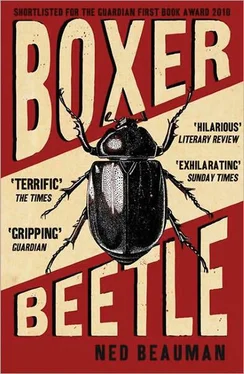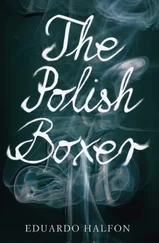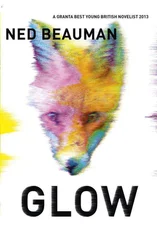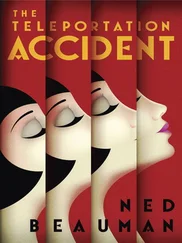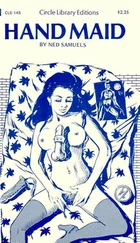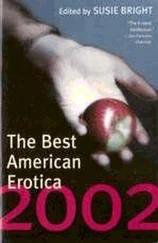when you are losing an argument, stuart
There was no response for a while, then, after a bit:
STUART: really?
KEVIN: yes
STUART: well, that’s weird
KEVIN: it’s not weird
you knew about seth roach before i did
you must have been looking for anophthalmus hitleri
yourself
you’d heard that grublock was convinced it was real
so you hired the welsh guy
and you guessed i’d get dragged into it, because i work for
grublock
so you told him to put on that thule society symbol because you knew that i would know what it meant, and i’d think he was an ariosophist, not just a gun-for-hire, and then i’d never suspect it was you
STUART: kevin, that’s ridiculous
you have too much imagination
come on, you’re my best friend
KEVIN: we’ve never actually met
STUART: what does that matter?
KEVIN: i know
but it’s the only anophthalmus hitleri in the world. the swastika wings, the name, the personal commendation from hitler, the sheer rarity — the fact that it eats human flesh! — it’s not just priceless, it’s practically mythical. even i hadn’t heard of it until all this started
are you saying you wouldn’t betray your best friend for that?
you would
i would
we all would
it’s our hobby and it’s our life
the only difference is, most of us can’t afford to hire a proper operative like that welsh guy
but you can
plus, you love all that stuff
assassins, mercenaries, special agents
you wouldn’t have been able to resist
Stuart didn’t reply at all this time, so I typed:
KEVIN: why ‘nbeauman’ anyway? who is that?
STUART: oh
all my sockpuppets are randomly generated
otherwise i wouldn’t be able to resist putting in some geeky reference, and it would be too easy to guess it was me
i’m really sorry, kevin.
Then he went offline.
A few days later, I had Sinner buried at the Jewish cemetery in Edmonton. I have no personal interest in ritual, but I felt I had to do something after my complicity in the unsettlement of his resting place. When I thought back to the rubbish dump on Back Church Lane I was reminded of its gargantuan great-nephew, the Waste Isolation Pilot Plant in New Mexico, a frequent locus of Stuart’s conspiracy theories. In a salt mine near the town of Carlsbad, the US government is (so they claim) burying thousands of drums of radioactive plutonium: the absolute worst of the worst, the nuclear equivalent of serial killers in isolation cells at a high-security prison. The waste will still be dangerous for hundreds of thousands of years, and the greatest challenge of the project is not the brute engineering, but the question of how to mark the site in a way that will be intelligible to the inquisitive North Americans of the distant future, be they cavemen or cyborgs. Those descendants must be warned away. But the Egyptians tried the same thing with the pyramids, and look how that turned out. So some anthropologists say we shouldn’t mark the site at all. Like Sinner, they hope an unmarked grave may never be disturbed. And probably, like Sinner, they’re wrong. Anyway, it’s almost irrelevant whether or not their procedures work as intended: if you fear that something will mutate you, then, really, it has already mutated you.
I’d telephoned Tara Southall to see if she wanted to come, and she told me she would send flowers but London was too far. So I was the only mourner on that warm Tuesday. Or at least I thought I was, at first. After the rabbi had finished the ceremony I thanked him, and he left me alone at the grave. That was when I noticed, some distance away, a pale, chubby man in a wheelchair, squinting at me. I didn’t recognise his face because I’d never even seen a photo, but of course I knew immediately who it was. I wondered how he’d found out about the burial.
But I didn’t go over to speak to him. Instead, I ran to catch up with the rabbi.
‘Rabbi,’ I said. ‘I have a confession to make.’
He stopped. There was a pleasant breeze, and instinctively I moved sideways a few steps to make sure I was downwind. ‘You’re mixing up your faiths,’ he said, smiling.
‘I know, I know, but — look, I have a hobby and it’s something terrible. I collect Nazi stuff. Lots of it. I’m not a Nazi, I promise, but I have this huge collection. I’ve never been in a proper Jewish place before and suddenly I feel like such a—’
‘Memorabilia of the Third Reich?’
‘Yes.’
He patted my arm. ‘You needn’t worry. I’m a collector myself.’
‘What?’
‘Well, not quite a collector. But I have a little box of trinkets at home. Quite a lot of European Jews do. I inherited it from my father. It’s rather like taking a trophy from a dead enemy. A scalp, if you like.’
‘Oh.’
‘I’m sure you have your reasons too. But, of course, if it has begun to distress you, you should get rid of it.’
I spent the rest of the day wondering whether I should do as he suggested. It wasn’t really that I was distressed — I didn’t meet many Jews in my daily life, so I didn’t often have to feel so weird — but somehow the excitement of those objects wasn’t quite as electric after all that had happened since Thursday. Still, by the following morning I’d decided that I would keep everything. What else would I do with my days? (Also, I’d made friends with Stuart on the forums. Now that we weren’t speaking I didn’t really have anyone else, so I thought perhaps I should try to make another friend in the same way. Or even two. And I certainly wasn’t going to go back to the trimethylaminuria forums to do it.)
But then I got a phone call from Teymur. That afternoon I had been reading a copy of The Perception of Harmony: A Life of Philip Erskine , which had just arrived in the post from an online secondhand bookshop. (The title turned out to be from an essay by Le Corbusier: ‘Architecture is the art above all others which achieves a state of platonic grandeur, mathematical order, speculation, the perception of harmony that lies in emotional relationships.’) Erskine had died, I learned, in a California health spa in 1981. He was divorced from his wife. Friends of his, interviewed by the biographer, seemed to think he had been working on an autobiography, but no manuscript was ever found. The book made no mention of Seth Roach.
‘It looks like the company’s being bought up by some investors from Japan,’ Teymur told me. ‘I’m afraid there’ll be no one to give you errands any more.’
‘That’s all right.’
‘That’s not what I’m calling about, though. It transpires that Mr Grublock had left some instructions about you in the event of his death.’
‘Really?’ I hadn’t been invited to Grublock’s funeral.
‘Yes. The number of instructions he left about various things was staggering, by the way. We’re still going through them. You’re to have his “collection”. All of it, apparently. I don’t even know which collection that means. He had several. I suppose it’s wine or something. But, anyway, the head porter at his building says it’s being boxed up and shipped to you.’
‘Oh. Thanks, Teymur.’
I hung up. I should have been thrilled by the news. But, really, although I was surprised and touched by Grublock’s totally unanticipated generosity, I felt a bit dejected. What did that leave of my hobby? (It reminded me of the day I finally completed my 78,000-word prose prequel to John Carpenter’s The Thing and found it strangely hard to celebrate.) Suddenly, I had one of the greatest Nazi memorabilia collections in the world — why would I spend hour after hour making negligible augmentations? And I couldn’t even brag about it on the forums — no one would believe me. (Was this how Grublock used to feel about everything in his life? Was this why he was so insatiable?)
Читать дальше
